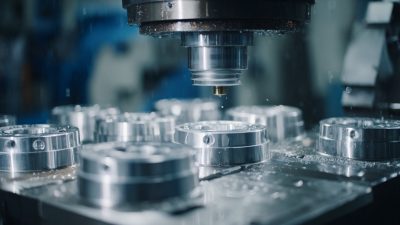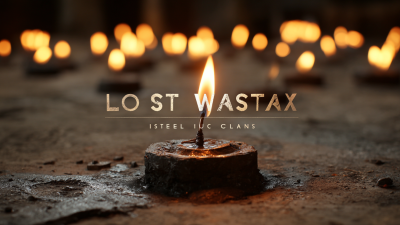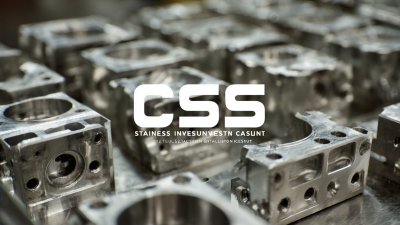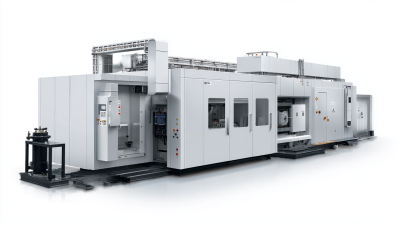The global demand for Stainless Steel Precision Casting continues to rise, driven by advancements in various industries such as aerospace, automotive, and machinery manufacturing. According to a recent market research report by Mordor Intelligence, the global stainless steel casting market is expected to reach approximately USD 34.5 billion by 2027, growing at a CAGR of around 6.2% from 2022. This growth underscores the critical importance of sourcing high-quality stainless steel precision castings on a global scale. As industries seek to enhance their product durability and performance, understanding effective sourcing strategies becomes essential.

This blog will provide seven actionable tips to help manufacturers and procurement professionals navigate the complexities of sourcing stainless steel precision casting from around the world while ensuring quality and cost-effectiveness.
Stainless steel precision casting is a manufacturing process that allows for the creation of complex shapes with high dimensional accuracy. This method, often referred to as investment casting or lost-wax casting, involves creating a wax pattern, coating it in a ceramic shell, and then melting away the wax to form a mold. According to the 2021 Market Research Future report, the global precision casting market is projected to reach USD 35 billion by 2027, driven by increasing demand from the aerospace, automotive, and medical sectors, where component precision is critical.

A vital aspect of sourcing stainless steel precision castings globally lies in understanding the materials involved. Stainless steel, known for its corrosion resistance and strength, typically comprises various alloying elements, such as chromium and nickel. This adds complexity to the sourcing process, as different applications may require specific grades of stainless steel. The Global Stainless Steel Market Report indicates that the demand for stainless steel is expected to grow at a CAGR of 3.8% from 2020 to 2026, emphasizing the need for manufacturers to carefully assess their sourcing strategies for precision castings in an increasingly competitive environment.
In the ever-evolving landscape of global manufacturing, sourcing stainless steel precision casting components from key suppliers is vital for achieving efficiency and quality. Identifying reliable suppliers necessitates an understanding of the unique challenges present in the sourcing environment, including fluctuating raw material availability and the reliance on critical minerals. Recent studies emphasize the importance of addressing resource scarcity, as countries grapple with sustainable extraction methods for essential materials. As a result, organizations must foster relationships with suppliers that are not only efficient but also committed to sustainable practices, ensuring that the supply chain can adapt to the rising pressures of sustainability.
Technological advancements are transforming procurement strategies in the stainless steel casting industry. Innovations such as wire arc additive manufacturing (WAAM) are setting new precedents, enhancing product quality and reducing defects in the casting process. Moreover, the integration of technologies that support the circular economy—like artificial intelligence—can further streamline supplier operations, reduce waste, and enhance overall productivity. By harnessing these new tools, companies can make informed decisions, optimizing their supplier selections and fostering long-term partnerships that align with both economic and environmental goals.
When sourcing stainless steel precision casting globally, evaluating quality standards and certifications is paramount. High-quality casting not only ensures product reliability but also mitigates risks associated with material failure. It’s essential to look for internationally recognized certifications such as ISO 9001, which highlights a commitment to quality management systems. Additionally, seek suppliers who have certifications for specific industries, like ASTM for the U.S. or EN standards in Europe, as these can guarantee adherence to stringent quality benchmarks.
One effective tip is to conduct thorough due diligence on potential suppliers. Assess their production processes and request documentation of their quality assurance practices. This can include reports from third-party inspections or customer testimonials regarding their product reliability. Another key recommendation is to prioritize suppliers who engage in continuous improvement programs, as these vendors are more likely to innovate and enhance their quality control measures consistently. This proactive approach ensures that the casting materials you receive meet both your specifications and industry requirements, ultimately leading to superior end products.
In today’s highly competitive manufacturing landscape, leveraging technology is crucial for streamlining sourcing processes, especially in the niche of stainless steel precision casting. By utilizing advanced digital tools like supplier management software and AI-driven analytics, businesses can significantly enhance their sourcing efficiency. These technologies allow companies to identify reliable manufacturers across the globe, assess their capabilities, and analyze pricing structures with unprecedented accuracy, ensuring that they can make informed decisions quickly.
Moreover, embracing e-commerce platforms and digital marketplaces can further simplify the sourcing journey. These platforms not only provide access to a vast network of suppliers but also enable real-time communication and transaction management. By implementing secure online payment systems and automated order tracking, companies can minimize delays and reduce the risk of miscommunication. Ultimately, integrating technology into sourcing processes not only drives cost-effectiveness but also fosters strong partnerships with suppliers, leading to long-term success in the precision casting industry.
| Tip Number | Tip Description | Benefits | Technology Used |
|---|---|---|---|
| 1 | Utilize Online Marketplaces | Wider access to suppliers | E-commerce platforms |
| 2 | Implement an ERP System | Streamlined operations | Enterprise Resource Planning |
| 3 | Leverage Data Analytics | Informed decision-making | Big Data tools |
| 4 | Use Virtual Prototyping | Reduced development costs | CAD software |
| 5 | Engage in Supplier Audits | Ensured quality standards | Quality management software |
| 6 | Adopt Automated Sourcing Tools | Faster sourcing cycles | Automation software |
| 7 | Utilize Cloud-Based Solutions | Enhanced collaboration | Cloud computing technology |
 Building strong relationships with casting manufacturers is crucial for sourcing stainless steel precision castings effectively on a global scale. The key first step is communication; understanding the manufacturer's capabilities and limitations helps in setting realistic expectations. Regular updates and open lines of communication can foster trust and collaboration, ensuring that both parties work towards a common goal. Additionally, engaging in site visits can provide deeper insights into the manufacturing processes and quality controls in place, solidifying the relationship further.
Building strong relationships with casting manufacturers is crucial for sourcing stainless steel precision castings effectively on a global scale. The key first step is communication; understanding the manufacturer's capabilities and limitations helps in setting realistic expectations. Regular updates and open lines of communication can foster trust and collaboration, ensuring that both parties work towards a common goal. Additionally, engaging in site visits can provide deeper insights into the manufacturing processes and quality controls in place, solidifying the relationship further.
Another important aspect is mutual respect for cultural differences and business practices. Each manufacturer comes with its unique set of traditions and approaches to business, which can heavily influence partnership dynamics. By being adaptable and showing respect for these variances, companies can enhance their relationships and potentially unlock new opportunities for collaboration. Finally, establishing long-term partnerships rather than one-off transactions encourages manufacturers to invest more in quality and innovation, ensuring that clients receive the best stainless steel precision castings possible.






